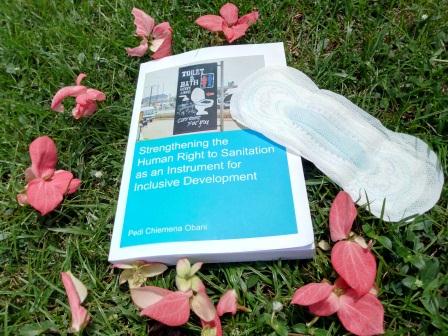
By Pedi Obani Iyayi
Two weeks ago, I travelled by road from Benin City to Lagos, a journey of around 4 hours on a good day. My period already started the previous day, so I knew to wear my sanitary towel before I embarked on my journey before 6am that morning. All the same, I was eager to change the towel when we took a break at Ore, barely two hours into the journey. But I left my bag with the extra sanitary towels inside the bus, I simply thought it would be easy to buy a new pack from the vendors in the busy commercial ‘complex’ where we had stopped for a break. That was a mistake! To my utmost surprise, only one vendor was selling sanitary towels. As if that was not enough, the vendor told me that she was not even allowed to sell sanitary towels because the operators of the eatery which housed the only toilets in the complex complained of the toilets being blocked with sanitary towels. As a result of the ban, she had hidden the sanitary towels so well that it took us at least 5 minutes of frantic search to locate one pack. She eventually found a pack for me and I thanked her profusely. But, I was sad that our transaction had assumed a clandestine character.
The experience reminded me of many stories of taboo associated with periods and the humiliation that many women still face during those 3 to 6 days of their lives, every month. It is paradoxical to think that the period which signifies regeneration, new life, and the continuation of the human race can also be the reason for dehumanising experiences! I have heard of girls missing school because they do not have toilets to use at school; women being made to sleep in animal sheds just because they are considered unclean during their period days. I have not had it so bad myself, yet I almost detest going outside my home on my period days. I do not want to venture outside when it is highly improbable that I can find a clean toilet with water and soap and facilities for disposing of my sanitary towel in many public places. But as I cannot afford to just sit at home for six days every month, else I will get the sack for sure, I have decided to speak out about the need to take menstrual hygiene into account in designing toilet facilities!

Providing a simple flush toilet just does not cut it, I would know! Period is a sign of life, and women all over the world deserve the opportunity to voice their period struggles and access the facilities they need to feel more comfortable during period days. Girls need to be able to discuss their periods freely and just live; they should not be judged for it! No one should make life any more difficult that it already is for us on period days, whether by banning the use of sanitary towels or by denying us the simple joy of our daily routines! Rather, we should be redirecting resources towards educating children, both male and female, as early as while they are in the primary schools, about menstrual hygiene and the safe management of sanitary products. This would likely spur the innovation of sustainable sanitary products much more than the current pervading culture of silence, and in some cases oppression! While I do not really care for the gender of the person who designs the sanitary products and facilities, it is imperative that the woman’s voice should be the ultimate standard for judging the utility!
Pedi Obani Iyayi (pedi.obani@gmail.com). Pedi currently works as a lecturer in the Faculty of Law, University of Benin, Nigeria. Her research interests include human rights, inclusive development, and sustainability. She also loves to travel, learn, and have a good laugh!










